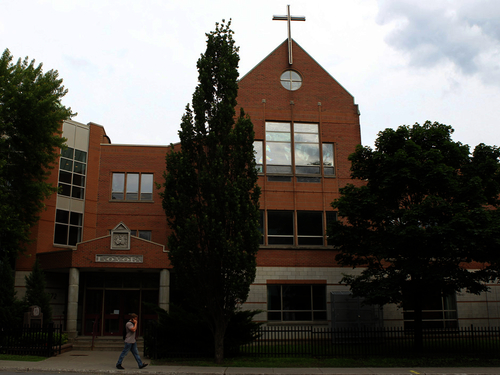When I was in school, merely spouting my opinions (of which I had many) did not get me good marks. Without data and supporting arguments for my opinions, they ended up being dismissed as tripe. That standard is missing from public discourse today, at least with regard to religious schools in Canada. Last week, another in a rash of anti-religious school stories came from Ontario, where a Toronto-area father won the right in court to send his son to a Catholic school while being exempted from all religious programs. The father told the National Post the decision relieves the family of "this prolonged anguish we have been put through." This week's story in that vein comes from Alberta, where the Calgary media seems surprised that a Christian school holds to a traditional view of marriage and an orthodox Christian view of hell. In all such cases, the mere presence of a religiously based school, it seems, qualifies as a threat to civility and decency. Simple orthodox religious expression is treated as shocking intolerance. In the Alberta case, Liberal MLA Kent Hehr, responding to the posting of an orthodox Christian statement of faith on a Christian school’s website, noted: "Fifteen years after the Supreme Court outlawed discrimination on the basis of sexual orientation, it is unbelievable this is still happening." But if our high school lessons about supporting arguments with data were observed, we would find Hehr's claim flies in the face of indisputable facts, as is so often the case with such criticism. The first fact is the Civil Marriage Act passed by Parliament in 2005. The very preamble of the legislation relied on by Hehr notes that "it is not against the public interest to hold and publicly express diverse views on marriage." Often overlooked is that the same clause protecting same-sex marriage from discrimination explicitly reinforces the charter's freedom of conscience and religion provision for "the expression of ... beliefs in respect of marriage as the union of a man and woman to the exclusion of all others based on that guaranteed freedom." The second data point involves nothing less than the Supreme Court of Canada, which has rejected the argument that having a community covenant reflecting traditional views of marriage is in itself discriminatory. In a landmark case, the British Columbia College of Teachers argued that because Trinity Western University had a community covenant, the school should not have the right to grant teacher’s licences. The Supreme Court sided with Trinity Western, noting that there was no evidence raised of discriminatory conduct. The court noted that the "proper place to draw the line is generally between belief and conduct." (It's worth observing the same discredited argument is playing out again as Trinity Western tries to open a law school.) In public skirmishes regarding religious schools, the focus is almost exclusively on the beliefs held. That is not to naively pretend that no occasion will ever be found in which a religious school engages in discriminatory conduct of one sort or the other—just as occurs in school systems that do not have religious statements of faith or community covenants. But to connect the pattern of that discrimination to the existence of a belief system rooted in a respect for every person as an image-bearer of God is a leap supported neither by law nor the evidence. If critics of religious schools did their homework, they would know that, in general, religious schools do at least as good a job—and in many cases, a better job—of achieving the purposes of public education than do public schools. A 2012 Cardus study, based on a representative survey of the Canadian population collected by Angus Reid, with an analysis conducted by the University of Notre Dame, points out that whether the measure is civic engagement, employment, or academic outcomes, non-government schools are achieving what we say we want public schools to achieve. Religious schools are a misunderstood minority that tend to mind their own business and not worry about promoting themselves. That is hardly justification for media, legal and political elites to run roughshod over the clearly established charter rights of religious communities to organize and operate their own schools as an expression of religious freedom. The glib headlines and faux outrage expressed by those critical of religious schools requires more careful argument than is being publicly offered. In fact, if those critics did the required study, they might be surprised whose charter rights are really being offended here.

Pennings: You have nothing to fear from religious schools
April 16, 2014

Cooperation and competition should be part of a new Canadian approach to labour policy
For the last few decades, labour policy in Canada has resembled Aesop's mountain in labour. We've heard a lot of rumblings, seen a lot of smoke and hot air, but we have not seen a major restructuring of the ground. A variety of initiatives from the federal Conservatives, as well as controversial proposals on right to work in Ontario and Alberta, have renewed the rumblings, complete with fire and brimstone rhetoric about "attacks on labour" from the union movement. But while the rhetoric and the old union versus non-union policy framework have remained unchanged since the 1970s, the "on-the-ground" realities of labour relations in Canada have changed drastically. We suggest these changes open the door to a new policy framework on labour relations that can move Canadian labour relations in a more innovative, competitive, direction. What are these changes? First, cooperation between unions and employers is more the norm than the exception. The data show that time lost due to strikes and lockouts has been on a steady decline since the 1970s and is currently near an all-time low. Second, collective bargaining is no longer the sole prerogative of traditional trade unions. A wide variety of alternative bargaining arrangements have emerged in the last decade. Among these are alternative unions whose approach to collective bargaining differs both philosophically and structurally from traditional trade unions; human resource departments that mimic the collective bargaining process; creation of private, for profit, organizations which mimic many of the functions formerly performed by trade unions (i.e. labour supply pools, employer organizations); and the emergence of more professional associations and colleges which regulate professions, and which, even incidentally, affect wages, bargaining, and labour standards. Collective bargaining is, in short, a diverse field, even while the main legal framework remains wedded to the traditional union versus. non-union arrangement. Two further changes are well known. Union density (the proportion of paid workers who are union members)in Canada has been trending down for some time, and is hovering at around 31.5%. This number stands alongside a second trend: namely, an increase in the already large gap between union densities in the public sector—currently around 75%—versus those of the private sector—currently around 18%. But beneath those trends lies a less discussed trend: the consolidation of unionized workers into fewer, larger, traditional trade unions via mergers and acquisitions. As Stats Canada notes: Unionized workers are highly concentrated in a small number of large unions […] 46.6% of covered workers in national and international unions belong to just eight unions each covering at least 100,000 workers.In sum, four per cent of unions represent almost half (47%) of Canadian workers. And, if one includes the second tier of unions by size, that concentration increases: 11% of Canadian unions represent 72% of the unionized workforce. This consolidation, combined with the unwillingness—expressed in "no-raid" pacts—of most of these unions to compete for the loyalty of members on the basis of service leads to a trade union movement which is virtually monolithic in form and message. And that message has, overwhelmingly, been anti-conservative. Unions tend to see small "c" conservative policy, and the parties that espouse these policies, as their enemies. They have been willing to spend large sums and mobilize to counter them and to install parties more in line with their views. It should be no surprise that the feeling is mutual. This antipathy displays itself in policy by way of proposals and legislation which aim to use regulation to directly shape how unions and individual workers—and even non-members—interact, either via the way dues are collected, how workers can join a union, or how and to whom unions should report their financial transactions. A recent spate of proposals and legislation are indicative. Federal bills C-377 and C-525, and the recent Ontario Progressive Conservative and Wildrose "right-to-work" proposals all aim directly at unions themselves. The difficulty with this approach is that, all too often, it lends itself to instability in labour policy. The potential for large swings in labour policy—depending on the party currently in power—increases as the common ground between labour and certain segments of political power disappears. Political power, while it might last for considerable periods of time, is never fully secure, and the absence of a consensus on labour policy often resembles a pendulum. The replacement of the NDP Bill 40—introduced by the Rae government—by Bill 7 by the Progressive Conservative government of Mike Harris in the 1990s is but one example. The recent elections in British Columbia also underscore the point. In an economic world where political and labour stability are key factors in investment decisions, this instability can mean lost investment, lost employment and lost government revenues. A better approach recognizes the value of collective bargaining while simultaneously recognizing that major changes in the world of labour relations are already underway under our current regime—and without government intervention. In short, we recommend a policy which encourages competition between the plurality of means of collective bargaining and employer/employee relationships already in existence in the Canadian economy. We suggest that labour policy should focus on three parallel tracks:That, insofar as possible, government refuse to craft policies which deliberately favour a particular method of workplace organization, labour worldview, or labour organization at play in Canadian economic life. Rather, government should enact policy which levels the playing field between the competing views and let civil society determine the most appropriate method. Particular efforts should be made to eliminate laws which allow labour monopolies, or labour oligopolies, or which encourage rent-seeking by labour organizations. Two examples of this are the Saskatchewan government’s Bill 80, which eliminated provisions that gave a few unions a monopoly on collective bargaining in the construction industry, and a private member’s bill in Ontario (Bill 73) that aimed to eliminate the ability of a few private sector unions to control public procurement. We suggest government remove barriers that deliberately penalize one method of organizing workers—whether that be individual contracts, traditional trade union arrangements, alternative unions, or employee associations—and let workers vote with their feet.That the government reevaluate the labour relations regime which currently oversees public sector bargaining, with a view to re-asserting the primary role of the state as government rather than employer in situations where a necessary state monopoly exists. The government should consider its role in the creation of the labour monopolies that exacerbate their fiscal concerns—health care and education for instance—rather than trying to use labour relations policy to solve what are, in effect, unnecessary government monopolies. That the government concentrates on improving and easing the ability of existing workers’ organizations to work towards policy goals where there is a modicum of consensus. Both the right and left agree that workplaces should involve workers as much as possible—i.e. be democratic—while also being accountable primarily to their members. This should be true for all methods of organizing workers, union or otherwise.A policy platform that best fits the framework described above will evaluate each policy through the lenses of competition and cooperation. The facts on the ground suggest that the world of labour relations is changing even in the absence of proposed revolutionary changes such as the removal of the Rand formula. What is needed is not policy that aims to tear down or maintain unions in their current form, but which allows workers the greatest leeway to choose the labour relations environments that serve their individual and collective interests best. A policy that encourages the greatest amount of competition among these various means of organizing workplaces would lead to much more innovation in the world of labour relations than any proposal looking to maintain the status quo, or that aims to upset it by revolutionary measures such as right to work. In short, the ideal would be a policy regime wherein the state encourages the positive aspects of workplace organization where there is a high degree of consensus, while attempting to remain neutral about the ways workers choose to organize themselves. Currently many unions have an unhealthy fear of markets and categorically deny the possibility of a vital union movement in which competition is present. They note that employers will inevitably take advantage of a competitive union world. But unions, like employers, need to come to terms with the notion that competition and cooperation—between employers and unions, between a variety of unions, and between a variety of employers—are integrally linked. As noted by economist Paul Rubin has said: "Cooperation is the heart of economics; competition is a tool for obtaining better cooperation." Our framework and policy proposals suggest a way forward for labour relations in Canada. Such an approach would see the state allow the full range of players in the labour relations "market"—including the variety of labour relations models present on the ground today—to compete toward the goal of greater innovation, greater productivity and a fair distribution of the wealth generated by economic activity.
April 16, 2014

Ray Pennings says: Don’t be afraid of religious schools
In a Calgary Herald op-ed yesterday, Cardus executive vice president Ray Pennings encouraged critics not to fear religious schools. Regarding cases such as the concern over Trinity Western University's community covenant, Pennings says: "...to connect the pattern of that discrimination to the existence of a belief system rooted in a respect for every person as an image-bearer of God is a leap supported neither by law nor the evidence. If critics of religious schools did their homework, they would know that, in general, religious schools do at least as good a job—and in many cases, a better job—of achieving the purposes of public education than do public schools. The complete article can be found at the Calgary Herald website.
April 16, 2014

Brian Dijkema published in <i>Inside Policy</i>
Published in the April 2004 issue of Inside Policy, "Cooperation and competition should be part of a new Canadian approach to labour policy" by Brian Dijkema suggests that what is needed in the world of labour relations is not policy that aims to tear down or maintain unions in their current form, but which allows workers the greatest leeway to choose the environments that best serve their individual and collective interests. Read the full article here.
April 15, 2014

CBC’s ‘The Public God’ forum featured Father Raymond J. de Souza and Janet Epp Buckingham
CBC's The Sunday Edition, hosted by Michael Enright, featured a program yesterday entitled: "The Public God—A Forum on the Role of Religion in Public Policy." Panelists included Rev. Gretta Vosper, Alia Hogben, and Moustafa Bayoumi, plus Convivium magazine editor-in-chief Fr. Raymond J. de Souza and Cardus senior fellow Janet Epp Buckingham. "As much as possible," said Buckingham, a lawyer and professor at Trinity Western University, "we do need to allow people to live within their conscientiously and deeply held beliefs, but you have to separate professional obligations from personal beliefs." Regarding Canada's Office of Religious Freedom, Fr. de Souza remarked: "Religious persecution is a massive problem. ... We're talking about massacres—every month, dozens and dozens, sometimes hundreds of Christians being killed. It's not only Christians; the Office of Religious Freedom deals with other minorities too. Religious freedom is one particular freedom that is a bellwether and indicates the general state of freedoms, and I think religious freedom, as highlighted by this government as part of their foreign policy, is a plus." Hear the entire program at the CBC website.
April 13, 2014

‘Fight for freedom goes beyond the courtroom,’ says Cardus president
This week on the ChristianWeek website, Cardus president Michael Van Pelt shed some light on why this organization decided to stand with Loyola High School in its fight for freedom: "Standing with others against insinuation of that hesitancy, and that fear, in the hearts of Canadians of religious faith is what drives Cardus daily. It is what led us to stand with little Loyola High School in Montreal as it took its case all the way to the Supreme Court of Canada on March 24 this year. "When we were first drawn to the case, not as activists but as a think tank able to provide intellectual and communications support, people frequently asked why an Ontario organization drawn from the Protestant tradition would concern itself with the fate of a private Catholic school in Quebec. Full disclosure: we asked it of ourselves." Read the rest of the article here.
April 9, 2014

Peter Stockland, publisher of <i>Convivium</i>, featured on CBC Calgary to discuss Quebec election results
This morning Peter Stockland, publisher of Convivium and resident of Montreal, was featured on CBC Calgary's The Eyeopener to discuss what Quebec election results with host David Gray. "It was a debacle for the PQ and it's going to take years for them to recover, if they ever do," said Stockland. "In this campaign, [Mme Marois] tried to play both sides against a kind of amorphous middle throughout the campaign, and she ended up, in a sense, losing contact with reality. She brought in an extreme corporate figure like Pierre Karl Péladeau, who's known as a very right-wing guy, into essentially a social democratic party and then had him—or he decided to—tout sovereignty at a time when they were trying to soft-pedal sovereignty ... There was a fundamental incoherence to what has been perceived as her strength: the ability to read the political winds." Listen to the entire clip below.
April 8, 2014

<i>Convivium</i> publisher sounds off about the Quebec election
Convivium publisher Peter Stockland wrote about québécois politics in the Calgary Herald, giving perspective to the threat of sovereignty. "It does no good, either, to blame the blather on the generalized woeful state of election campaigning everywhere. Whether or not we accept Quebec’s long-standing claim to constitutional exceptionalism, there is no doubt that the combined fiscal, demographic, linguistic, cultural and political trials looming over it are uniquely daunting. It has more dire need than most to carry out an effective democratic politics, and less time than any to put those politics into meaningful practice." Read the full piece at the Calgary Herald website.
April 4, 2014

Cardus president quoted in National Post coverage of Loyola case
Eight years after the Supreme Court of Canada unanimously rejected Quebec’s ban on Sikh kirpan daggers in the classroom, another major test of academic religious freedom comes to Canada’s top court Monday, as a private Catholic boys high school in Montreal fights for the right to teach ethics and religious culture in its own Jesuit style. This time, though, legal arguments from the school, the province, and several religious intervenors from across the country, will be made in the strained climate of an election campaign dominated by Quebec’s cultural insecurity and vulnerability, epitomized in the governing Parti Québécois’ proposed Charter of Values. “In a certain sense, the situation has become more tense,” said John Zucchi, a McGill University history professor who was a plaintiff in the original case, on behalf of his son, Thomas, then a student at Loyola High School. The course was created by the Liberal government of former premier Jean Charest, but the PQ has magnified this tension, Mr. Zucchi said, by “pandering” to narrow interests and confusing the fundamental issues of accommodation. The basic principles of that philosophy trivialize and, for all practical purposes, negate religious experience and belief The basic question, as trial judge Gérard Dugré put it, is “whether the state can secularize the teaching of religion and morality within the very walls of a private Catholic denominational school.” The answer cuts to the heart Quebec’s post-Catholic secular identity within a multicultural Canada. First taught in 2008, Quebec’s mandatory high school course in ethics and religious culture is, as Judge Dugré wrote, “the culmination of the process of secularization of public schools undertaken by the Quebec government… in that it secularizes the teaching of ethics and religious culture.” The course embodies a “relativistic philosophy, commonly known as ‘normative pluralism,’” the judge wrote. “The basic principles of that philosophy trivialize and, for all practical purposes, negate religious experience and belief.” Private schools like Loyola may be exempted from teaching it, provided they offer another “equivalent” course. Much disagreement sprung from the interpretation of that word. In their 2008 request for exemption, the school said “our students are very well trained in the key values proposed by the new program, but that training is carried out in a manner respectful of the Catholic faith and the moral values that form the cornerstone of our school.” The province refused, saying the Loyola program “does not lead the student to reflect on the common good, or on ethical issues, but rather to adopt the Jesuit perspective of Christian service.” In his 2010 ruling, which quashed the province’s refusal on religious freedom grounds, Judge Dugré noted the province’s order “places Loyola in an untenable position: either it teaches the ERC program required by the Minister and thus violates its religious precepts, or it teaches the ERC course with its own program and thus violates the Act.” THE GAZETTE / John Kenney In December, 2012, Quebec’s Court of Appeal granted the province’s appeal, affirmed the minister’s original decision, and set the stage for this week’s Supreme Court hearing. Michael Van Pelt, president of the Christian-focused think tank Cardus, said a key legal question is whether religious freedom is a right of an institution, not just individuals. The answer is not clear. Judge Dugré clearly found that, as an institution, Loyola has religious freedom and it was violated. But by the letter of the law, that was something of a leap. Both the federal Charter, and Quebec’s Charter of Human Rights and Freedoms, say rights belong to people (“Every person” in the Quebec one, “Everyone” in the Canadian one). They do not mention institutions. A broader concern, Mr. Van Pelt said, is whether this refusal of Quebec to allow a private Catholic school to teach ethics and religious culture from a religious perspective reflects the kind of country Canadians want to live in. Do we want to create this kind of hesitancy among religious institutions in Canada? A ruling against Loyola would mean any religious institution that works in the public interest would be hesitant to express its own values in Canadian public life, he said. Religious service groups, from schools to charities, regularly display a connection between deeply held beliefs and day to day actions. “Do we want to create this kind of hesitancy among religious institutions in Canada?” Mr. Van Pelt said. “If we have a negative judgment at the Supreme Court on this, that continuity gets broken,” he said. “This is not the kind of social architecture we want to build in this country.” Loyola is named for Saint Ignatius of Loyola, founder of the Jesuit order, famous for its scholarship and intellectual engagement. Pope Francis is the first Jesuit to become Pope. Mr. Zucchi’s son Thomas, 19, has since gone on to university, but he received the school’s preferred style of education because of the original court victory, which Mr. Zucchi said helped him prepare for the demands of higher education. But the wider problem is not resolved. “I’m more optimistic at the Supreme Court level than I was as the [Quebec] appeal court level,” he said. “I think religious rights are taken very seriously.”
March 24, 2014
